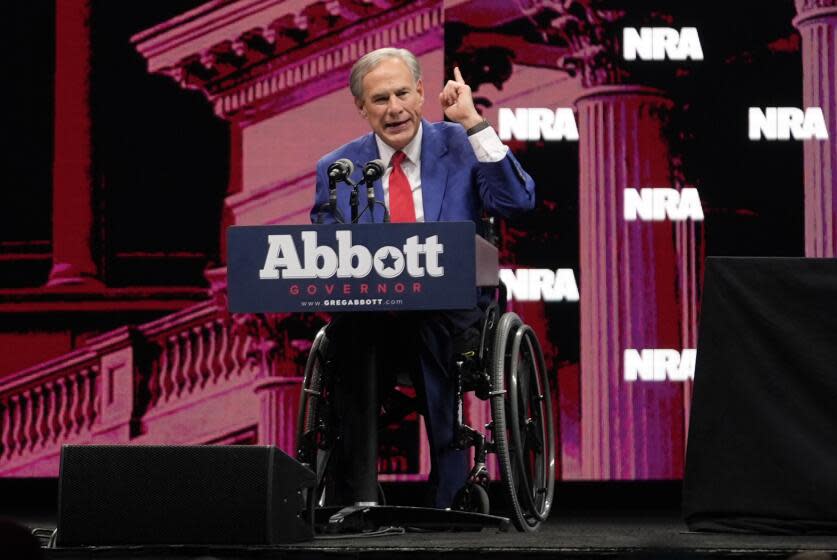Granderson: Whose lives matter to Texas' governor?

- Oops!Something went wrong.Please try again later.
- Oops!Something went wrong.Please try again later.
This is a tale of two pardons in Texas.
The first was requested for George Floyd, the Black man whose murder by Minnesota police in 2020 sparked nationwide protests. His family sought a posthumous pardon in Texas related to a minor drug conviction from 2004. The officer who arrested him was later accused of fabricating evidence and was himself charged with murder.
When the Texas Board of Pardons and Paroles reviewed the request and in 2021 recommended pardoning Floyd, Republican Gov. Greg Abbott did nothing. He waited. For months following the board’s recommendation, Abbott refused to talk publicly about a pardon for Floyd. And finally, mysteriously, the board reversed its recommendation in 2022 — sparing the governor from making what would surely have been a politically unpopular decision for or against the request.
Which brings us to the second pardon in our tale. The one Abbott was excited to talk about.
Read more: Granderson: A football player said something stupid about women. Let it go
During the wave of Black Lives Matter protests that followed Floyd’s murder, then-President Trump tweeted in June 2020, “any protestors … who are going to Oklahoma please understand, you will not be treated like you have been in New York, Seattle, or Minneapolis. It will be a much different scene!”
Daniel Perry, a 30-year-old Army sergeant and Uber driver in Austin, responded to Trump’s tweet with “send them to Texas we will show them why we say don’t mess with Texas.”
Read more: Granderson: Texans don't hate migrants. Why do they elect such a cruel governor?
A year later, Perry posted on social media: “I might have to kill a few people on my way to work, they are rioting outside my apartment complex.” He then drove into a crowd of Black Lives Matter protesters in Austin before shooting and killing one of them, 28-year-old Garrett Foster, a Texan and an Air Force veteran who was legally and openly carrying an AK-47. Foster was white, as is Perry.
After a trial that lasted more than a week, and after 17 hours of deliberations, a Texas jury found Perry guilty of murder.
And Abbott — who went radio silent when the parole board recommended pardoning Floyd — expressed public support for a Perry pardon the day after his conviction and directed the board to expedite its review.
“Texas has one of the strongest ‘Stand Your Ground’ laws of self-defense that cannot be nullified by a jury or a progressive District Attorney,” Abbott said in a statement. “I look forward to approving the Board’s pardon recommendation as soon as it hits my desk.”
He then added: “I have already prioritized reining in rogue District Attorneys,” which was curious given that at the time Ken Paxton, the state’s attorney general, was under criminal investigation on securities fraud charges. Last month a Texas appeals court ruled Paxton could face discipline from the state bar association over failed attempts to overturn the 2020 general election. And yet it’s not Paxton, a Republican, whom Abbott wanted to rein in. It is district attorneys in the parts of Texas where they tolerated things like Black Lives Matter protests.
Abbott is signaling that he wants such tolerance to stop. He apparently wants murderers to be freed if they hated the same people that Abbott hates. Perry fits the bill; he documented his hate for protesters in frequent texts and social posts.
This sort of tug of war between large blue cities and petty red governors happens a lot around the country. Abbott wasn't motivated to clear Floyd's name because it wasn't a benefit to his political cause. A pardon for Perry was a different story. And sadly, we all know why.
On the night when he would later be shot and killed, Foster was interviewed by a reporter who asked why he was carrying a weapon during a peaceful protest. He said he was doing so to exercise his 2nd Amendment rights.
Perry told police afterward that he didn’t see Foster lift his weapon or aim it at anyone. Perry made clear before he even got to the protests that he was looking to kill. The claim of killing Foster in self-defense just doesn’t hold up, as 12 jurors recognized when they convicted Perry of murder.
Judging by Abbott’s statement regarding the Texas “stand your ground” law, the governor would like to muddy the waters and pretend that what happened that night was self-defense. Despite the evidence.
Just as he allowed the conviction of George Floyd to stand, despite the evidence that the pardon board reviewed.
At first glance, it all may seem like separate legal cases. But take a step back, and you'll see the same worldview.
And that is the tale of two pardons — and one hateful man.
This story originally appeared in Los Angeles Times.

